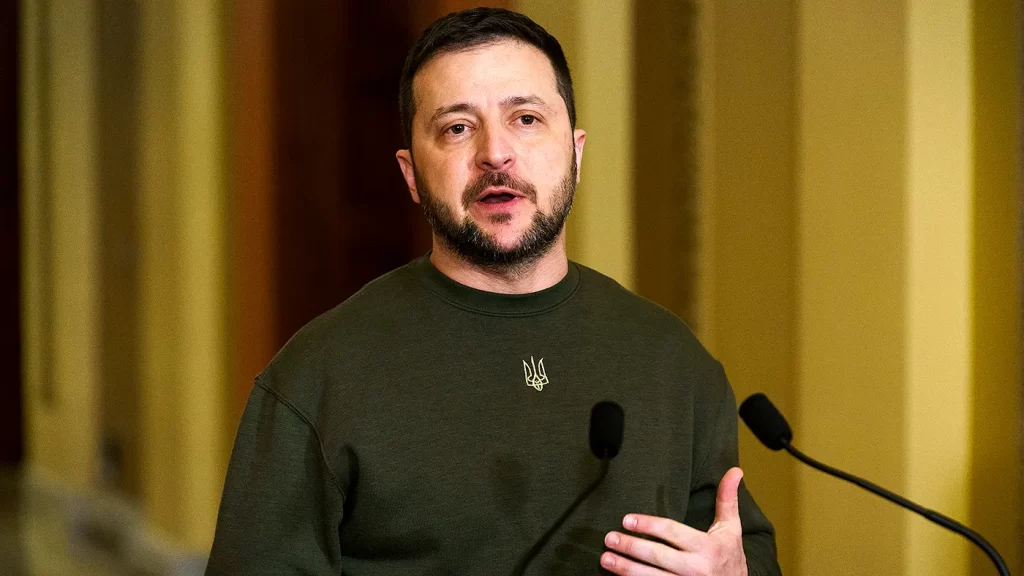War with Russia closer to end than we think – Zelensky
3 min read

Ukrainian President Volodymyr Zelensky has expressed optimism regarding the potential end of the conflict with Russia, suggesting that peace may be closer than many realize. In an interview with ABC News, he stated, “I think that we are closer to peace than we think. We just have to be very strong, very strong.”
Zelensky emphasized that his upcoming victory plan, which he intends to present to U.S. President Joe Biden, will call for increased support from Ukraine’s allies to bolster the Ukrainian military. He clarified that the plan does not involve negotiations with Russia but serves as “a bridge to a diplomatic way out, to stop the war.” He believes that Ukraine can compel Russian President Vladimir Putin to consider ending the conflict only if Kyiv presents a united and strong front.
Kremlin spokesman Dmitry Peskov responded cautiously to reports of Zelensky’s plan, asserting that the conflict would only conclude when Russia’s objectives are met. This sentiment reflects ongoing tensions and the complexity of reaching a resolution.
Zelensky has consistently urged Western nations to lift restrictions on Ukraine’s ability to use long-range missiles capable of striking deep into Russian territory. As he prepares for his visit to the U.S., he is expected to reiterate this request. President Biden indicated that a decision on this matter has not yet been reached, but Zelensky underscored the importance of U.S. leadership, stating, “Everybody’s looking up to [Biden], and we need this to defend ourselves.”
During his visit, Zelensky is scheduled to address the United Nations General Assembly and meet with prominent U.S. political figures, including presidential candidates Donald Trump and Kamala Harris. This trip underscores Ukraine’s ongoing need for international support as it faces intensified attacks from Russia.
Amidst this backdrop, Czech Republic President Petr Pavel commented on the war’s trajectory, suggesting that Ukraine must adopt a realistic approach to reclaiming territory in the eastern part of the country currently under Russian control. He noted that a partial Russian occupation of Ukrainian territory is likely to persist for years. “A defeat of either Ukraine or Russia will simply not happen,” he told The New York Times, indicating that the resolution to the conflict would fall somewhere in between complete victory and defeat.
Zelensky’s visit comes at a critical time, as Ukraine continues to endure relentless assaults. Recently, Russian forces targeted a high-rise apartment block in the northeastern city of Kharkiv, resulting in three fatalities and 15 injuries. Local authorities reported that the attack employed glide bombs, highlighting the brutal tactics used by Russian troops.
In addition to the Kharkiv attack, there was significant damage to infrastructure in the eastern town of Poltava, and in Zaporizhzhia, a missile strike left one person dead and six wounded. The Russian military has made considerable gains in the eastern regions of Ukraine, with troops advancing towards Vuhledar, a strategic city in the Donbas area that has been a focal point since the onset of the full-scale invasion.
Ukrainian military expert and retired Colonel Kostyantyn Mashovets has cautioned his compatriots to mentally prepare for potential losses in key areas such as Selydove, Toretsk, and Vuhledar. “I would love to be wrong,” he stated on Facebook, expressing concern about the likelihood of these scenarios unfolding based on current intelligence.
The situation remains fluid, with both military and diplomatic developments closely watched by the international community. Zelensky’s assertive stance on gaining military support from allies and his belief in the possibility of peace highlight the complex interplay of hope and reality facing Ukraine in its ongoing struggle against Russian aggression. As the conflict continues, the prospect of a resolution remains uncertain, yet Zelensky’s comments reflect a determination to pursue a path toward peace while maintaining military strength.